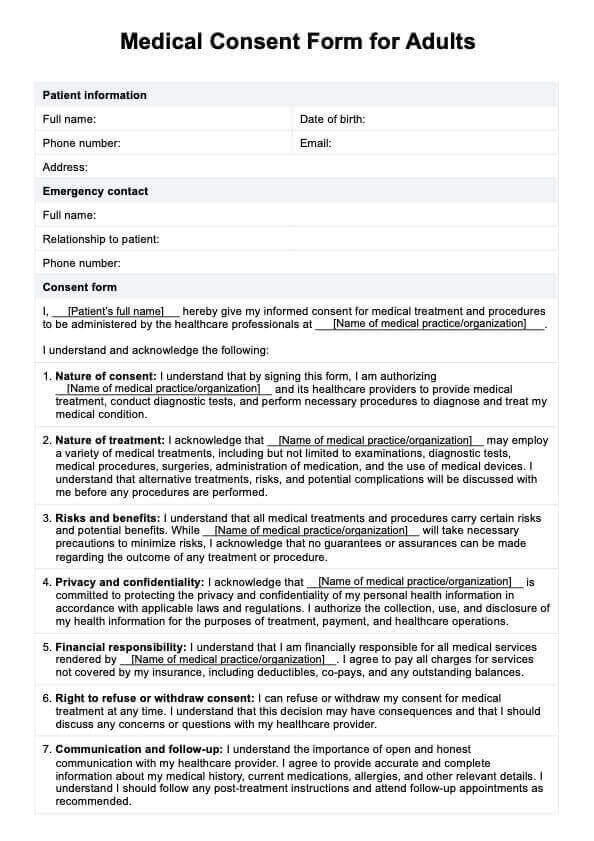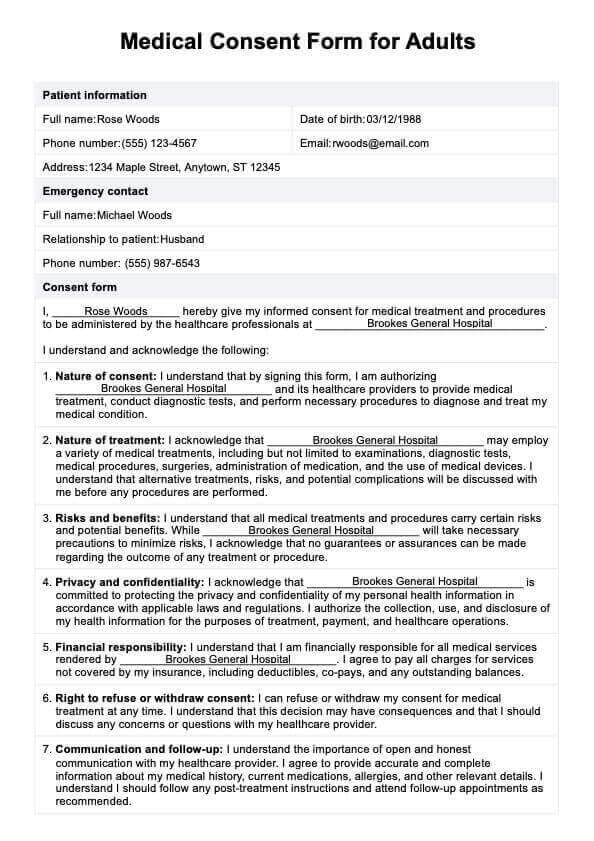
Streamline how patients authorize medical treatment and procedures with our Medical Consent Form for Adults template.

By Bernard Ramirez on Sep 03, 2024.


A Medical Consent Form for Adults is a crucial document used in healthcare to obtain informed consent from adult patients before initiating medical treatment, procedures, or interventions. Medical consent forms serve as a legal and ethical safeguard, ensuring patients clearly understand their medical care and actively participate in decision-making.
This adult medical consent form then outlines the patient's written consent to receive medical treatment and acknowledges their comprehension of the associated risks, benefits, and alternatives. It covers various aspects such as diagnostic tests, surgeries, medication administration, and the use of medical devices. By signing this form, patients authorize healthcare professionals to provide the necessary care by their professional judgment and in the patient's best interests.
A medical consent form generally emphasizes the patient's right to refuse or withdraw consent at any time. It also addresses the privacy and confidentiality of the patient's health information and their financial responsibility for medical services rendered. The form may include fields for the patient's personal and emergency contact information, ensuring efficient communication and follow-up.
PDF Template Example PDF

Our medical consent form template involves several key components to ensure proper completion and understanding by the patient and the healthcare provider:
The form typically includes fields for the patient's full name, date of birth, address, contact number, and email address. This information helps identify the patient and establish communication.
It is essential to collect details of an emergency contact person, including their full name, relationship to the patient, and contact number. This ensures that there is someone to contact in case of an emergency.
The form should include a section that explains the nature of consent. Signing the form implies the patient's authorization for medical treatment, diagnostic tests, and procedures.
Provide a clear and concise explanation of the potential risks and benefits of the proposed medical treatments or procedures. This information helps patients make informed decisions about their healthcare.
Include a section highlighting the healthcare provider's commitment to maintaining the privacy and confidentiality of the patient's medical information by applicable laws and regulations.
Clearly state the patient's financial responsibility for the medical services rendered, including details regarding insurance coverage, deductibles, co-pays, and any outstanding balances.
Explain that patients have the right to refuse or withdraw consent at any time and outline the potential consequences of doing so.
Emphasize the importance of open communication between the patient and healthcare provider, including the need for accurate and complete information regarding the patient's medical history, medications, and allergies. Encourage patients to follow post-treatment instructions and attend recommended follow-up appointments.
These are spaces for the patient's signature, date of signing, and a witness's signature to validate the consent. It is essential to ensure that both parties involved sign the form.
Our printable Medical Consent Form for Adults is a versatile resource used in various healthcare settings and situations and is particularly important for compliance and medical decisions. Here are some instances when this template would be appropriate and beneficial:
Physicians, general practitioners, and healthcare clinics can utilize this form to obtain consent from adult patients before initiating routine medical care, such as physical examinations, vaccinations, or minor treatments.
Surgeons and specialists can employ this consent to treat form for adults to obtain informed consent for undergoing surgical procedures, invasive treatments, or complex interventions. This ensures patients comprehensively understand the risks, benefits, and alternatives involved.
Radiologists, laboratory technicians, and other healthcare professionals conducting diagnostic tests, such as MRIs, CT scans, or biopsies, can use the consent form to inform adult patients about the purpose, potential discomfort, and risks associated with these tests.
Researchers conducting clinical trials or research studies involving adult participants should use this medical authorization form for adults to obtain their informed consent. This ensures that participants are aware of the study's objectives, procedures, potential benefits, and risks.
Mental health professionals and counselors can use the form to obtain informed consent from adult patients seeking therapy, counseling, or psychiatric treatment. This ensures that patients understand the nature of the therapeutic relationship and any potential risks involved.
Staff in assisted living facilities, nursing homes, or residential care facilities can utilize the form to obtain consent for medical treatment and procedures from elderly residents who can provide informed consent.
In urgent medical situations where obtaining consent is impossible, healthcare providers can use previously signed and valid consent forms to guide treatment decisions. However, explaining the treatment and seeking verbal consent from the patient or their authorized representative is still advisable if time permits.
It is important to note that the Medical Consent Form for Adults is a flexible resource that can be adapted to the specific needs and requirements of different healthcare practitioners and institutions. By utilizing this form appropriately, healthcare providers can ensure that patients are fully informed and actively engaged in their healthcare decisions. This also ensures that their rights are respected throughout treatment.
Using the Medical Consent Form for Adults offers healthcare providers and patients several benefits. Here are some key advantages:
The form ensures compliance with legal and ethical requirements by documenting the patient's informed consent. It is a legally binding document that can protect healthcare providers in disputes or legal issues.
The form promotes patient autonomy by providing comprehensive information about the proposed medical treatment, procedures, risks, benefits, and alternatives. It enables patients to make informed decisions about their healthcare based on a clear understanding of available options.
By discussing the details outlined in the form with the patient, healthcare providers can engage in meaningful conversations, address patient concerns, and establish effective communication channels. This fosters a stronger patient-provider relationship and builds trust.
The consent form educates patients about potential medical treatments or procedures risks. It encourages patients to ask questions and raises awareness, allowing them to weigh the risks against the potential benefits and make informed choices.
The form serves as a crucial part of the patient's medical record. It provides comprehensive and standardized documentation of the patient's consent, ensuring the accuracy and accessibility of information for future reference or continuity of care.
Obtaining informed consent through the use of this template prioritizes patient safety. It helps prevent misunderstandings, reduces the likelihood of adverse events due to a lack of understanding, and supports a culture of patient-centered care.
By leveraging the benefits of the Medical Consent Form for Adults, healthcare providers can promote patient autonomy, establish transparent communication, and mitigate risks, ultimately contributing to improved patient care and safety.